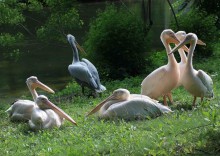It is difficult to overestimate the role of volunteers in the life of Ukraine. In addition to working in the social and military spheres, people of goodwill are also saving our nature. Tourist volunteerism, when volunteers go away for several days to respond to environmental challenges, has been gaining more and more popularity in the last while.
Solving a problem may result in the improvement, if not the restoration, of an ecosystem. The Ukrainian Birds Society cares about the conservation of birds – by creating favorable conditions for the latter, they give a new lease of life to vast territories. There are more than 400 species of birds in Ukraine, 87 of which have been put on Ukraine’s Red Data List and 11 are on the verge of extinction.
A project, “More Fresh Water to Birds,” has been carried out for almost two months now at Kinburnska Kosa regional landscape park and Biloberezhia Sviatoslava national nature park in Mykolaiv oblast. There are some big beautiful lakes on the territory of Ochakiv and Berezan districts. The trouble is they have begun to dry up lately – they get practically dry as the summer comes. For this reason, birds stop nesting and procreating. According to Viktoria Shevchuk, member of the Ukrainian Birds Society, she and the like-minded people have decided to intervene and restore the big freshwater lakes. It is planned, in conjunction with commercial structures, to install two wind pumps in the two conservation areas. All details have been coordinated with relevant services and ecologists. This work is supposed to result in the conservation of these lakes and, accordingly, the entire ecosystem, including more than 240 species of birds, such as white pelicans, herons, eiders, and many others, that have been nesting there for centuries.
“One of such high-profile projects has already been implemented in Mykolaiv oblast’s national nature park Biloberezhia Sviatoslava. Canals had been inoperative for many years there – they all ran dry, and we saw almost a desert in some cases. We restored the canals past year. We did this for our friends, pelicans, which had earlier inhabited the Bienkovi overflow land in Biloberezhia Sviatoslava. Many years ago, almost the entire European population – up to 90 percent – of the great white pelican inhabited this place. But now the pelicans have flown to Romania because our conditions are in fact unviable. We expect them to come back,” Shevchuk says, “for birds are a noticeable indicator of environmental changes – if the place is polluted, they leave it; if there’s nothing to eat, birds look for food in a different place; if poachers come, they vanish. So, it is easy to see what is happening to the environment if you watch birds.”
Young people are actively taking up the call to volunteer in go-away ecological projects. According to project organizers, more than 400 volunteers took part in the Biloberezhia Sviatoslava event in 2014.







